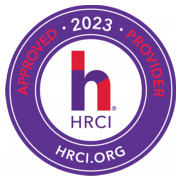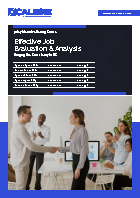| Date | Venue | Fee | |
|---|---|---|---|
| 08 Jun - 12 Jun 2026 | Dubai – UAE | $ 5,950 | Register Now |
| 03 Aug - 07 Aug 2026 | Dubai – UAE | $ 5,950 | Register Now |
| 26 Oct - 30 Oct 2026 | Dubai – UAE | $ 5,950 | Register Now |
| 21 Dec - 25 Dec 2026 | Dubai – UAE | $ 5,950 | Register Now |
About the Course
Currently, positions require greater flexibility and continuous participation of people, transforming them into multidisciplinary teams that can change depending on the environment. The position can be analysed in a global way where all activities are performed by an employee who is located in a position in the organisational chart. Describing the functions of an employee means relating what the employee does to why he does it. The job description is a simplified portrait of the employee's content and primary responsibilities.
In this 5-day interactive Effective Job Evaluation & Analysis training course, we look at how to establish and manage a framework for job analysis, understanding all the roles in an organisation and describing them through job profiles or job descriptions. It will allow the delegates to develop a suitable grade and salary structure that supports the organisation's needs. A practical job evaluation & analysis system can ensure that employees are appropriately rewarded for having the skills and knowledge the business needs. It will provide key job analysis tools and a detailed familiarisation with job evaluation, including an introduction to the most commonly used best-practice approaches.
Core Objectives
The specific objectives are to provide the delegates with management skills that allow them to plan to decide compensation and benefits packages, perform appraisals, analyse training and development needs, assess the worth of a job, and increase personnel and organisational productivity.
The delegates will achieve the following objectives:
- Discuss the features and purpose of a job analysis process
- List the techniques of data collection
- Distinguish between job description and specification
- Identify the role of the environment in influencing job design
- Recognise the critical components of a job design
Training Approach
To accelerate the delegates' development assertively, a lot of practical content is shared, which can (and should) be put into practice in the work environment immediately. Besides the theoretical presentation, this training course will be structured based on group conducting techniques, where diversified activities and resources will be applied, such as group dynamics, audiovisual resources, simulations, exercises, and case studies, always to maximise delegates' participation, involvement, and learning.
It will be held in a face-to-face format and can be adapted according to the company's needs. Through the constant improvement of their skills, employees will be able to contribute consistently to the organisation, making the work environment even better, more human, collaborative, and productive.
The Attendees
This Effective Job Evaluation & Analysis training course aims to provide the delegates with the skills, techniques, and methods necessary for an adequate process of analysis and job description.
Likewise, it will be valuable to the professionals but not limited to the following:
- Recruiters
- Business Owner
- HR Professionals
- People Managers
- Business Leaders
- Entrepreneurs
- Talent Acquisition Professionals
- Human Resource Business Partner (HRBP)
Daily Discussion
DAY ONE: DESCRIPTION AND ANALYSIS OF FUNCTIONS IN HR
- Job Description and Competency Management
- The Analysis of Functions: Identification of the Portfolio of Competencies
- The Importance of Clarifying Roles
- Principles of Analysis, Description, and Qualification of Functions
- Intrinsic and Extrinsic Aspects
DAY TWO: THE ROLE DESCRIPTION AND ANALYSIS PROCESS
- Determination of Objectives
- Identification of the functions to be analysed
- Choice of Method to Apply
- Comparison and Collection of Existing Information
- Analysis and Writing of Functions
DAY THREE: OBJECTIVES, STRUCTURE OF ANALYSIS AND DESCRIPTION OF FUNCTIONS
- Analysis Methods and Description of Functions: Advantages and Disadvantages
- Direct Observation Method
- Interview Method
- Questionnaire Method
- Mixed Method
DAY FOUR: THE DIFFERENT METHODOLOGIES OF QUALIFICATION OF FUNCTIONS
- Scheduling Method (Job Ranking)
- Factor Comparison Method
- Points Evaluation Method
- Description of Role and Definition of Competence
- Identification of Transversal and Specific Skills
DAY FIVE: THE FUNCTION ANALYSIS INTERVIEW
- The Interview Guide
- The Right Questions
- Behaviors to adopt and avoid during the interview
- Techniques for Writing Analysis Dossiers
- Periodic Reviews and Updates
Certificate Awarded
Upon successful completion of this training course, participants will be awarded a Certificate of Completion from XCalibre Training Centre, acknowledging their accomplishment. This certificate serves as a testament to their dedication to developing their skills and advancing their expertise in their respective fields.

Course Enquiry

A Human Resource Certification Institute (HRCI)® Pre-approved Training Course


